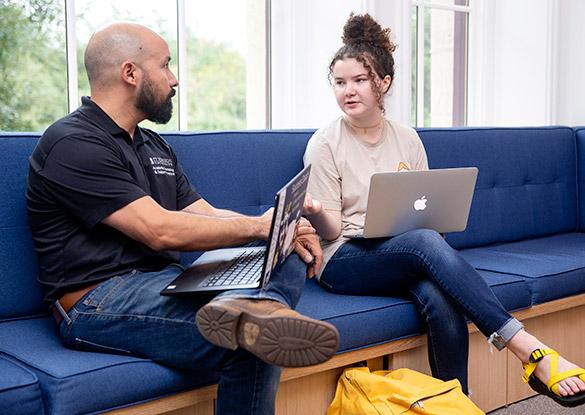
Major Roadmap
Explore your options — classes, internships, research and study abroad. Use the Global Language and Cultural Studies Major Guide to find what interests you, discover what you love, and create a major experience that jumpstarts your future.
Engage with diverse cultures and languages from around the world to become a global citizen.
Develop language proficiency in one or more languages, including Spanish, French, German and Japanese. Explore different cultures and worldviews through literature, film, music, and other media. Gain intercultural communication skills and global awareness. Prepare for careers in fields such as international business, diplomacy, translation, education, and more.
As a Global Languages and Cultural Studies major, you will engage with diverse cultures and languages from around the world. By studying not one but two modern languages, you will enhance communication skills, cross-cultural understanding and critical thinking. Embrace the challenge and fulfillment of becoming bilingual or trilingual, thus opening doors across the hemispheres and becoming a true global citizen. Graduate ready to bring your skills to any sector, from the United Nations to a multinational corporation. The world is yours!
What do our graduates do?
Global Languages and Cultural Studies majors go on to a variety of careers and graduate schools from St. Edward’s. Here’s a sample.
- Education and language instruction
- International business and commerce
- Diplomacy and government service
- Non-profit and humanitarian work
- Translation and interpretation
- Journalism and media for international news agencies
- Travel, hospitality, airlines, arts and culture
For more information on the Global Languages and Cultural Studies major, please contact Philippe Seminet. This major is part of the Department of Languages, Literatures and Cultures.
The Classroom and Beyond
As a Global Languages and Cultural Studies major, you’ll have opportunities to expand your horizons through study abroad and to practice new languages through experiential learning. Opportunities will also be available to broaden your skill set and practice what you've learned locally in Austin.
Experiential Education
Your courses will teach you to apply what you learn in real-life situations. In Topics in Comparative Languages, Literatures and Cultures, you'll better understand the world around you by sharing your own experiences as well as learning about those of your classmates. You may also take classes like Multilingualism in the U.S. and Intercultural Communication which improve your communication skills, cross-cultural understanding and critical thinking.
Study Abroad
Studying abroad is the perfect way to immerse yourself in a new environment and rely exclusively on your language skills. These programs will help you understand another culture and how people in another country view the United States. They also offer tremendous opportunities for personal growth. St. Edward’s offers study-abroad opportunities in Spain, France, Costa Rica, Japan, Italy and more. You can choose a program in which a St. Edward’s professor leads students in classes and guided travels for several weeks, or you can study at an international university for a semester. When you study at an overseas university, you’ll live in campus housing with students from that country or with a host family, which immerses you in the rhythms of daily life.
Student Organizations
Language clubs (Spanish, French, German and Japanese), as well as Alpha Mu Gamma (the Honors Languages club) give you the opportunity to connect with students with similar interests and global worldviews. The International Student Association and Latinx Student Leaders Organization also offer you the chance to learn more about other cultures through social activities and programs.
The Kozmetsky Center of Excellence at St. Edward’s brings international experts to campus, either in person or virtually, to share their knowledge with the university community. Past speakers have included American and foreign diplomats, policy makers, university scholars, and leaders of the business, non-profit and cultural communities. You’ll have the chance to listen and ask questions of these global experts in sustainable development, peace and security, global health, climate change and global finance.
Degree Requirements
Major Requirements: The BA in Global Languages and Cultural Studies is a 36-hour major requiring students to choose a primary language (18 hours beginning at 2311 or higher), a secondary language (12 hours beginning at 1311 or higher) and to complete 2 required core courses (CLLC 1310, CLLC 4330) taught in English. Languages include German, French, Spanish and Japanese. Students who test out of or place beyond beginning and intermediate levels will complete the degree with approved electives.
Electives: Students who are waived from intermediate courses through the departmental placement test or who demonstrate advanced proficiency may choose to take up to 6 hours of approved electives (in English) to reach the 36-hour major requirement.
View and download the full degree plan for the Global Languages and Cultural Studies major (PDF).
Our Faculty
Major faculty include Dr. Emily Bernate, Dr. Cary Einberger, Dr. Regina Faunes, Dr. Sharon Nell, Dr. Georgia Seminet, Dr. Philippe Seminet and Dr. Emma Woelk.
Fulfilling the Language Requirement
The targeted level of language proficiency is "Intermediate High to Advanced Low" in both
speaking and writing for the primary language and “Intermediate” in the second language. There
are several ways to achieve the minimum proficiency required for the degree.
What if I already speak another language?
If you have studied another language formally and did not grow up hearing the language, you are probably a second-language learner. You can take a placement test or receive credit through CLEP or AP exams.
If you grew up hearing another language within your home, you are probably a heritage learner. We have special classes designed to help heritage learners improve their grammar, vocabulary, and cultural knowledge. You can also take a placement test or receive credit through CLEP or AP exams.